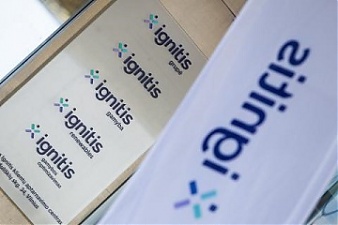Energy, EU – Baltic States, Financial Services, Good for Business, Lithuania
International Internet Magazine. Baltic States news & analytics
Monday, 16.02.2026, 22:52
Ignitis Group concluded a financing agreement with the European Investment Bank
 Print version
Print version |
|---|
“We are happy that EIB has offered the conditions that
satisfy the needs of Ignitis Grupe group of companies the best and that
it is already the third project of the group that is financed through
successful cooperation with EIB. We have already signed the contracts with EIB
for the loan of EUR 190 mln intended to finance construction works of Vilniaus
kogeneracinė jėgainė in Vilnius and for granting the loan of 258 mln zloty to
Pomerania Wind Farm sp. z o. o. intended to finance the park of wind power
plants that is developed in Poland,” says Darius Kašauskas, the Director
of Finance and Treasury at Ignitis Grupė.
“This operation gives off an important signal about the
energy market in the Baltics, namely that investments are shifting from a focus
on security of supply towards energy efficiency. This is good news and very
important in terms of our collective commitment to the Paris agreement. Climate
change won’t stop if we don’t act, and in that context every initiative to
limit our energy consumption is a big help”, says EIB Vice-President Thomas
Östros.
During the first stage of installation of smart meters
starting next year, ESO is planning till the end of 2023 replace approx. 1.2 mln
units of smart meters in Lithuania, starting with users, who use the biggest
share of energy. The procurement of smart metering infrastructure is under
implementation now. The competitive dialogue with potential suppliers is going
on.
COVID-19 pandemic also affects this procurement, so some
stages last longer and than planned before the pandemic. The restrictions applied
in various places also affect the process.
ESO finished the qualification screening of suppliers of the
procurement of smart metering infrastructure in February 2020. It was one of
the most important stages in the procurement process, when the suppliers, who
satisfy most the qualification and who are experienced in similar projects in
other countries, were selected. In final stage selected supplier will have to
provide not only smart meters but also IT solutions for collection and
management of meters’ data and communication infrastructure.
When implementing further actions in the procurement
process, the selected tenderers were introduced to comprehensive technical
specifications. The suppliers have already submitted the primary tenders and at
present the competitive dialogue with potential suppliers is going on. They
will be able to submit final tenders for procurement later and the most
economically beneficial tender will win.
The installation of smart meters is provided in the National
Energy Independence Strategy approved by the Lithuanian Parliament in 2018. The
National Energy Regulatory Council approved the planned investments of EUR 147 mln
in September 2019 and emphasized that the benefit brought by smart accounting
will exceed the expenses spent on its implementation.
The smart meters scheduled for installation by ESO for 2021
will enable competition in the market, which will encourage developing new
services. In the first stage smart meters will be installed for the users, who
use more than 1,000 kWh electricity per year. At the same time, new meters will
become a tool that will enable consumers to analyse and save, while ESO will be
able to identify and fix the problems quicker. It is planned to finish first
stage installation of smart meters (started with the largest users) until the
end of 2023. The second stage will start in 2024 and the meters will be
replaced for the users, whose metrological inspection deadline will be matured.
- 28.01.2022 BONO aims at a billion!
- 26.08.2021 LLC Dizozols Investments finalizes investment attraction deal with Crowdestor with record-high profits
- 13.02.2021 Моя жизнь в газете. Очерки по новейшей истории Латвии. Глава 1
- 25.01.2021 Как банкиры 90-х делили «золотую милю» в Юрмале
- 30.12.2020 Накануне 25-летия Балтийский курс/The Baltic Course уходит с рынка деловых СМИ
- 30.12.2020 On the verge of its 25th anniversary, The Baltic Course leaves business media market
- 30.12.2020 Business Education Plus предлагает анонсы бизнес-обучений в январе-феврале 2021 года
- 30.12.2020 Hotels showing strong interest in providing self-isolation service
- 30.12.2020 EU to buy additional 100 mln doses of coronavirus vaccine
- 30.12.2020 ЕС закупит 100 млн. дополнительных доз вакцины Biontech и Pfizer








 «The Baltic Course» Is Sold and Stays in Business!
«The Baltic Course» Is Sold and Stays in Business!

